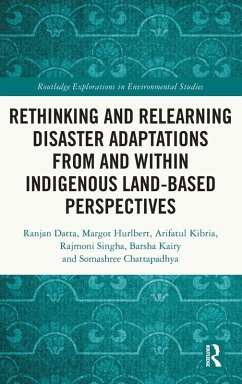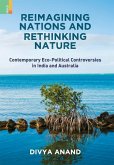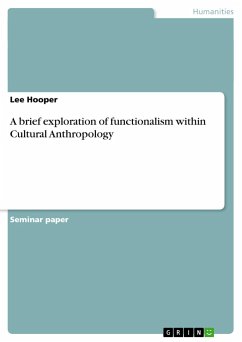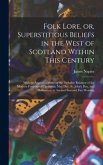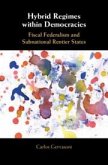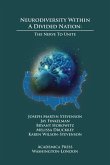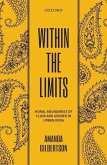Arifatul Kibria, Barsha Kairy, Margot Hurlbert, Rajmoni Singha, Ranjan Datta, Somashree Chattapadhya
Rethinking and Relearning Disaster Adaptations from and within Indigenous Land-Based Perspectives
Arifatul Kibria, Barsha Kairy, Margot Hurlbert, Rajmoni Singha, Ranjan Datta, Somashree Chattapadhya
Rethinking and Relearning Disaster Adaptations from and within Indigenous Land-Based Perspectives
- Gebundenes Buch
- Merkliste
- Auf die Merkliste
- Bewerten Bewerten
- Teilen
- Produkt teilen
- Produkterinnerung
- Produkterinnerung
This book offers a critical exploration into Indigenous knowledge systems, particularly focusing on Indigenous land-based knowledge and practice in reshaping disaster adaptations.
Andere Kunden interessierten sich auch für
![Reimagining Nations and Rethinking Nature: Contemporary Eco-Political Controversies in India and Australia Reimagining Nations and Rethinking Nature: Contemporary Eco-Political Controversies in India and Australia]() Divya AnandReimagining Nations and Rethinking Nature: Contemporary Eco-Political Controversies in India and Australia66,99 €
Divya AnandReimagining Nations and Rethinking Nature: Contemporary Eco-Political Controversies in India and Australia66,99 €![A brief exploration of functionalism within Cultural Anthropology A brief exploration of functionalism within Cultural Anthropology]() Lee HooperA brief exploration of functionalism within Cultural Anthropology15,95 €
Lee HooperA brief exploration of functionalism within Cultural Anthropology15,95 €![Folk Lore, or, Superstitious Beliefs in the West of Scotland Within This Century: With an Appendix Shewing the Probable Relation of the Modern Festiva Folk Lore, or, Superstitious Beliefs in the West of Scotland Within This Century: With an Appendix Shewing the Probable Relation of the Modern Festiva]() James NapierFolk Lore, or, Superstitious Beliefs in the West of Scotland Within This Century: With an Appendix Shewing the Probable Relation of the Modern Festiva36,99 €
James NapierFolk Lore, or, Superstitious Beliefs in the West of Scotland Within This Century: With an Appendix Shewing the Probable Relation of the Modern Festiva36,99 €![Does Confucianism still influence the Korean economy? Social values within Korea's economy Does Confucianism still influence the Korean economy? Social values within Korea's economy]() Aliza DanschDoes Confucianism still influence the Korean economy? Social values within Korea's economy15,95 €
Aliza DanschDoes Confucianism still influence the Korean economy? Social values within Korea's economy15,95 €![Hybrid Regimes Within Democracies Hybrid Regimes Within Democracies]() Carlos GervasoniHybrid Regimes Within Democracies132,99 €
Carlos GervasoniHybrid Regimes Within Democracies132,99 €![Neurodiversity Within a Divided Nation Neurodiversity Within a Divided Nation]() Joseph Martin StevensonNeurodiversity Within a Divided Nation167,99 €
Joseph Martin StevensonNeurodiversity Within a Divided Nation167,99 €![Within the Limits Within the Limits]() Amanda GilbertsonWithin the Limits53,99 €
Amanda GilbertsonWithin the Limits53,99 €-
-
-
This book offers a critical exploration into Indigenous knowledge systems, particularly focusing on Indigenous land-based knowledge and practice in reshaping disaster adaptations.
Hinweis: Dieser Artikel kann nur an eine deutsche Lieferadresse ausgeliefert werden.
Hinweis: Dieser Artikel kann nur an eine deutsche Lieferadresse ausgeliefert werden.
Produktdetails
- Produktdetails
- Verlag: Taylor & Francis Ltd
- Seitenzahl: 134
- Erscheinungstermin: 30. Januar 2025
- Englisch
- Abmessung: 234mm x 156mm
- ISBN-13: 9781032881331
- ISBN-10: 103288133X
- Artikelnr.: 71577496
- Herstellerkennzeichnung
- Produktsicherheitsverantwortliche/r
- Europaallee 1
- 36244 Bad Hersfeld
- gpsr@libri.de
- Verlag: Taylor & Francis Ltd
- Seitenzahl: 134
- Erscheinungstermin: 30. Januar 2025
- Englisch
- Abmessung: 234mm x 156mm
- ISBN-13: 9781032881331
- ISBN-10: 103288133X
- Artikelnr.: 71577496
- Herstellerkennzeichnung
- Produktsicherheitsverantwortliche/r
- Europaallee 1
- 36244 Bad Hersfeld
- gpsr@libri.de
Ranjan Datta is Canada Research Chair in Community Disaster Research at Indigenous Studies, Department of Humanities, Mount Royal University, Calgary. Alberta, Canada. Dr. Datta's current research interests include advocating for Indigenous land-rights, Indigenous community disaster research, community resiliency on climate change, community-based participatory action research, decolonization, and Indigenous reconciliation. Dr. Datta published 97 peer-reviewed publications, four books, and six edited books on responsibilities on decolonization, cross-cultural perspectives on reconciliation, Indigenous water, Indigenous climate change, anti-racist perspectives on climate change, and environmental sustainability issues. Dr. Datta has developed a strong understanding of decolonial and Indigenist research frameworks in his 17 years conducting research with Indigenous and non-Indigenous communities in Canada, USA, Africa, Europe, and South Asia. He is strongly committed to and passionate about Indigenous environmental sustainability, reconciliation, environmental management, Indigenous land rights, anti-racist theory and practice, decolonization, social and environmental justice, community gardens, and cross-cultural research methodology and methods. Margot Hurlbert is a Professor and Canada Research Chair, Tier 1, Climate Change, Energy, and Sustainability Policy of the Johnson Shoyama Graduate School of Public Policy, University of Regina. She explores the gap between what is needed to address climate change and current policy and behavior. Margot's scholarship concerns climate change adaptation and mitigation, energy, Indigenous peoples, water, droughts, floods, water governance, and sustainability. Margot has authored IPCC AR6 and Special Reports and was a member of Future Earth's Earth Commission Working Group on Transformations (2019-2022). She is an expert panel member on "Adaptation" for the Canadian Climate Institute and an Expert with the Canadian Climate Law Initiative. Arifatul Kibria is a feminist scholar who actively supports and promotes the rights and interests of marginalized and disadvantaged communities. She aims to amplify the voices of Indigenous and minority communities through an educational framework that incorporates decolonial and Indigenist perspectives. She holds the position of Associate Professor in the Department of Social Sciences within the Faculty of Arts and Social Sciences at American International University-Bangladesh. She has a diverse range of academic interests, which encompass sociological theories, gender studies, governance, social change and mobility, migration, and climate change. In 2002 and 2001, respectively, she obtained her Master of Social Sciences (MSS) and Bachelor of Social Sciences (BSS) degrees in sociology from the University of Dhaka. In 2011, she earned her PhD in social structure, stratification, and inequality from the Department of Sociology at Renmin University of China. Rajmoni Singha is an Assistant Professor at the Department of Sociology, at North South University, Bangladesh. Dr. Singha earned his PhD in anthropological research focusing on Manipuri weavers and their challenges in Bangladesh at Charles Darwin University in Australia and Master's degree in Master of Development Practice (MDP) from James Cook University, Australia. Singha's broad research areas are anthropological research, contemporary development challenges, qualitative research methods in social sciences, health and environment, climate change and health, Indigenous knowledge and environmental management, and ethnicity and identity studies. Barsha Kairy is a Master's Student at the Johnson Shoyama Graduate School of Public Policy, University of Regina. She holds a Bachelor's and Master's in Education from the University of Dhaka and has worked with various organizations. She has a passion for Social Science and has pursued a second Master's in Development Studies. She currently works in the development sector, focusing on research on Indigenous communities, gender, disaster resilience, climate change, gender, and public policy. Her goal is to dedicate herself to academia for better service. Somashree Chattapadhya is a Master's Student at the Natural Resource Institute (NRI) at the University of Manitoba, Canada. Her research focuses on community empowerment through addressing climate change, water and sanitation, agriculture, etc. She is passionate about working with Indigenous and minority communities as she believes in changing the community through her work. She works for Water.org as a Program Manager, providing household-level solutions for accessing water and sanitation, especially in climate-vulnerable areas. She is interested in exploring the gender aspect of climate change, water resource management, Indigenous land-based studies, etc. She completed her master's degree in environmental economics as a second topper from the University of Dhaka in 2015.
Chapter One: Reclaiming Indigenous Community-led Disaster Adaption
Chapter Two: The Meanings of Community-led Disaster Adaptation Strategies:
A Case
Study with the Munda Indigenous Community in Bangladesh
Chapter Three: Indigenous-Led Climate Change Adaptation from and within the
Manipuri
Indigenous Community-Based Perspective
Chapter Four: Flood Disaster Impact and Adaptation: Learning Reflections
from Marma
Indigenous Communities, Chittagong Hill Tracts in Bangladesh
Chapter Five: Marma Traditional Land-based Practice in Building Community
Resilience-
Perspective from Chittagong Hill Tracts (CHT), Bangladesh
Chapter Six: Climate Change and Women's Perspectives in the Coastal Areas
in Bangladesh
Chapter Seven: The Role of Indigenous Laitu Khyeng Youth in Building
Community
Resilience-Perspective from CHT Bangladesh
Chapter Eight: Advancing Indigenous Community-led Disaster Adaption
References
Index
Chapter Two: The Meanings of Community-led Disaster Adaptation Strategies:
A Case
Study with the Munda Indigenous Community in Bangladesh
Chapter Three: Indigenous-Led Climate Change Adaptation from and within the
Manipuri
Indigenous Community-Based Perspective
Chapter Four: Flood Disaster Impact and Adaptation: Learning Reflections
from Marma
Indigenous Communities, Chittagong Hill Tracts in Bangladesh
Chapter Five: Marma Traditional Land-based Practice in Building Community
Resilience-
Perspective from Chittagong Hill Tracts (CHT), Bangladesh
Chapter Six: Climate Change and Women's Perspectives in the Coastal Areas
in Bangladesh
Chapter Seven: The Role of Indigenous Laitu Khyeng Youth in Building
Community
Resilience-Perspective from CHT Bangladesh
Chapter Eight: Advancing Indigenous Community-led Disaster Adaption
References
Index
Chapter One: Reclaiming Indigenous Community-led Disaster Adaption
Chapter Two: The Meanings of Community-led Disaster Adaptation Strategies:
A Case
Study with the Munda Indigenous Community in Bangladesh
Chapter Three: Indigenous-Led Climate Change Adaptation from and within the
Manipuri
Indigenous Community-Based Perspective
Chapter Four: Flood Disaster Impact and Adaptation: Learning Reflections
from Marma
Indigenous Communities, Chittagong Hill Tracts in Bangladesh
Chapter Five: Marma Traditional Land-based Practice in Building Community
Resilience-
Perspective from Chittagong Hill Tracts (CHT), Bangladesh
Chapter Six: Climate Change and Women's Perspectives in the Coastal Areas
in Bangladesh
Chapter Seven: The Role of Indigenous Laitu Khyeng Youth in Building
Community
Resilience-Perspective from CHT Bangladesh
Chapter Eight: Advancing Indigenous Community-led Disaster Adaption
References
Index
Chapter Two: The Meanings of Community-led Disaster Adaptation Strategies:
A Case
Study with the Munda Indigenous Community in Bangladesh
Chapter Three: Indigenous-Led Climate Change Adaptation from and within the
Manipuri
Indigenous Community-Based Perspective
Chapter Four: Flood Disaster Impact and Adaptation: Learning Reflections
from Marma
Indigenous Communities, Chittagong Hill Tracts in Bangladesh
Chapter Five: Marma Traditional Land-based Practice in Building Community
Resilience-
Perspective from Chittagong Hill Tracts (CHT), Bangladesh
Chapter Six: Climate Change and Women's Perspectives in the Coastal Areas
in Bangladesh
Chapter Seven: The Role of Indigenous Laitu Khyeng Youth in Building
Community
Resilience-Perspective from CHT Bangladesh
Chapter Eight: Advancing Indigenous Community-led Disaster Adaption
References
Index

